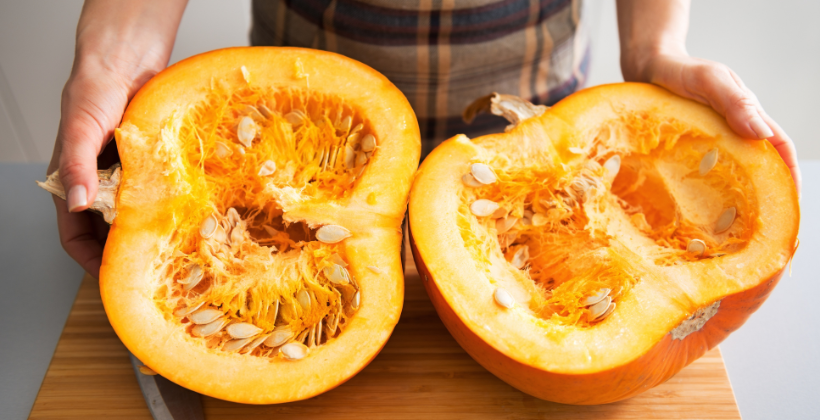Pumpkin Doesn’t Just Taste Good, It’s Good for You: 7 Benefits of Pumpkin
Tis the season for pumpkin spice! This wildly popular fall fruit not only tastes great, but it’s good for you too!
Pumpkin is a type of winter squash, belonging to the Cucurbitaceae family. It’s native to North America and has become a fall staple, especially around Halloween and Thanksgiving. Although pumpkin is scientifically classified as a fruit, it’s nutritionally more like a vegetable.
Pumpkin tastes so good you might feel a little guilty indulging. But don’t worry! This superfood is linked to a long list of health benefits. Check out these seven impressive health and nutrition benefits of pumpkin:
- Supports Eye Health
Pumpkin is chock-full of nutrients, including vitamin A, which is great for your vision and strengthening the immune system, especially as your body ages. Just a single serving (about one cup) of pumpkin has more than 200% of the daily recommended intake of vitamin A. Pumpkin also contains lutein and zeaxanthin, compounds that protect your eyes from age-related macular degeneration and cataracts. You’ll get a boost of vitamins C and E as well from pumpkin, both of which function as antioxidants and may prevent free radicals from damaging your eye cells. The National Eye Institute conducted a clinical trial in 2019 called the Age-Related Eye Disease Study (AREDS). The results showed that high doses of vitamin C, vitamin E, and beta carotene had links to a significantly reduced risk of age-related macular degeneration.
- Immunity Booster
Studies show pumpkin is packed with vitamins, which can strengthen your immune system, according to PubMed Central. A serving of pumpkin provides 19% of the recommended daily allowance of vitamin C, which is a known immune booster and helps reduce cell damage from free radicals. Pumpkin is also full of a lot of other immunity-boosting antioxidants, including vitamin A, vitamin E, iron, and folate.
- Heart Healthy
Potassium is key to supporting heart health, and pumpkin contains 16% of the daily recommended amount. Heart-healthy nutrients found in pumpkin like vitamin C, fiber, and antioxidants can all help to prevent heart disease, lower blood pressure, and reduce the risk of strokes, according to the National Institutes of Health (NIH) Office of Dietary Supplements.
- Cancer Fighter
Dietician Julia Zumpano, RD, LD says pumpkin is a good source of cancer-fighting carotenoids. Carotenoids are plant pigments produced by yellow, orange, and red plants like pumpkin, which combat the effects of free radicals in your body and may help protect you against certain types of cancer. These compounds have been linked to lower risks of stomach, throat, pancreas, and breast cancers.
- Promotes Weight Loss
If you’re on a diet, pumpkin may help you reach your goals. Pumpkin is a nutrient-dense food with a low calorie count – just 50 calories per cup. Consisting of 94% water, pumpkin is a weight-loss-friendly food that will help keep you full longer due in part to its high fiber content.
#6. Healthy Skin
Pumpkin contains nutrients that are good for your skin (PubMed Central). It’s high in carotenoids like beta carotene, which can act as a natural sunblock, and vitamin C, which aids in collagen production. Pumpkin also contains lutein, zeaxanthin, vitamin E, and other antioxidants, which help to keep your skin strong and healthy.
#7. Healthy Seeds
Don’t throw out the pumpkin seeds! Pumpkin seeds are edible and loaded with nutrients. A reduced risk of cancer, and improved bowel, bladder, prostate and heart health are all benefits of consuming pumpkin seeds according to studies noted by WebMD.
Bring on the pumpkin this fall and all year round! And as an added bonus, pumpkin is a great addition to your recipes when baking with stevia. Try this Easy Pumpkin Pie Dip and Spread recipe. Just 3 ingredients and perfect for office parties and family gatherings.




